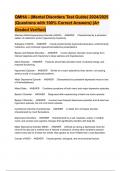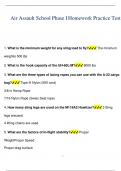QMHA - (Mental Disorders Test Guide) 2024/2025
(Questions with 100% Correct Answers) (A+
Graded Verified)
Attention-Deficit/Hyperactivity Disorder (ADHD) - ANSWER Characterized by a persistent
pattern of inattention and/or hyperactivity-impulsivity.
Subtypes of ADHD - ANSWER Include predominantly hyperactive/impulsive, predominantly
inattentive, and combined hyperactive/inattentive presentations.
Bipolar and Related Disorders - ANSWER Involve atypical, dramatic mood swings from
intense happiness and impulsivity to deep sadness and hopelessness.
Manic Episode - ANSWER Features abnormally elevated mood, increased energy, and
impaired functioning.
Hypomanic Episode - ANSWER Similar to a manic episode but less severe, not causing
serious social or occupational problems.
Major Depressive Episode - ANSWER Characterized by persistent depressed mood or loss
of interest/pleasure.
Mixed State - ANSWER Combines symptoms of both manic and major depressive episodes.
Bipolar I Disorder - ANSWER Diagnosed after experiencing at least one manic episode.
Bipolar II Disorder - ANSWER Involves more frequent depressive episodes and at least one
hypomanic episode, but not a full manic episode.
Cyclothymic Disorder (Cyclothymia) - ANSWER A milder form of bipolar disorder
characterized by mood fluctuations.
Depressive Disorders - ANSWER Characterized by a sad, hopeless, empty, or irritable
mood, and somatic and cognitive changes that significantly interfere with daily life.
Major Depressive Disorder (MDD) - ANSWER Defined as having a depressed mood for
most of the day and a marked loss of interest or pleasure, among other symptoms present
nearly every day for at least two weeks. May appear as more irritable than a sad disposition.
Causes of MDD - ANSWER Include genetic, biological, and environmental factors.
, Oppositional Defiant Disorder (ODD) - ANSWER Children who display a frequent and
persistent pattern of angry or irritable mood, argumentative/defiant behavior, or vindictiveness.
Symptoms of ODD - ANSWER Include angry/irritable mood, argumentative/defiant behavior,
or vindictiveness. Children with ODD are frequently resentful or easily annoyed.
Conduct Disorder - ANSWER Involves a persistent pattern of disruptive and violent
behaviors that violate the basic rights of others or age-appropriate social norms or rules,
causing significant impairment in the child or family's daily life.
Temperamental Risk Factors for Conduct Disorder - ANSWER Include difficulties in infancy,
below-average intelligence, and comorbidity with other disorders such as ADHD, learning
disabilities, and depression.
Environmental Risk Factors for Conduct Disorder - ANSWER Consist of harsh or
inconsistent child-rearing practices, child maltreatment, parental criminality, frequent changes of
caregivers, large family size, familial psychopathology, and early institutional living.
Community Risk Factors for Conduct Disorder - ANSWER Involve neighborhood exposure
to violence, peer rejection, and association with a delinquent peer group.
Symptoms of Conduct Disorder - ANSWER Include aggression towards people and animals,
destruction of property, deceitfulness or theft, and serious violations of rules.
Obsessive-Compulsive Disorder (OCD) - ANSWER Characterized by persistent intrusive
thoughts (obsessions) and repetitive behaviors (compulsions) to alleviate anxiety.
Causes of OCD - ANSWER Genetic predisposition, environmental factors like childhood
trauma, and high stress levels.
OCD Compulsions - ANSWER Behaviors aimed at reducing anxiety but are excessive and
unrealistic.
Schizophrenia - ANSWER Brain disorder affecting thinking, with symptoms like delusions,
hallucinations, and disorganized behavior.
Physiological Factors of Schizophrenia - ANSWER Complications during pregnancy, birth,
urban upbringing, and birth season may increase risk.
Schizophrenic Positive Symptoms - ANSWER Include delusions, hallucinations,
disorganized speech, and abnormal behavior.
Schizophrenic Negative Symptoms - ANSWER Flat affect, social withdrawal, lack of
motivation, and reduced speech.






